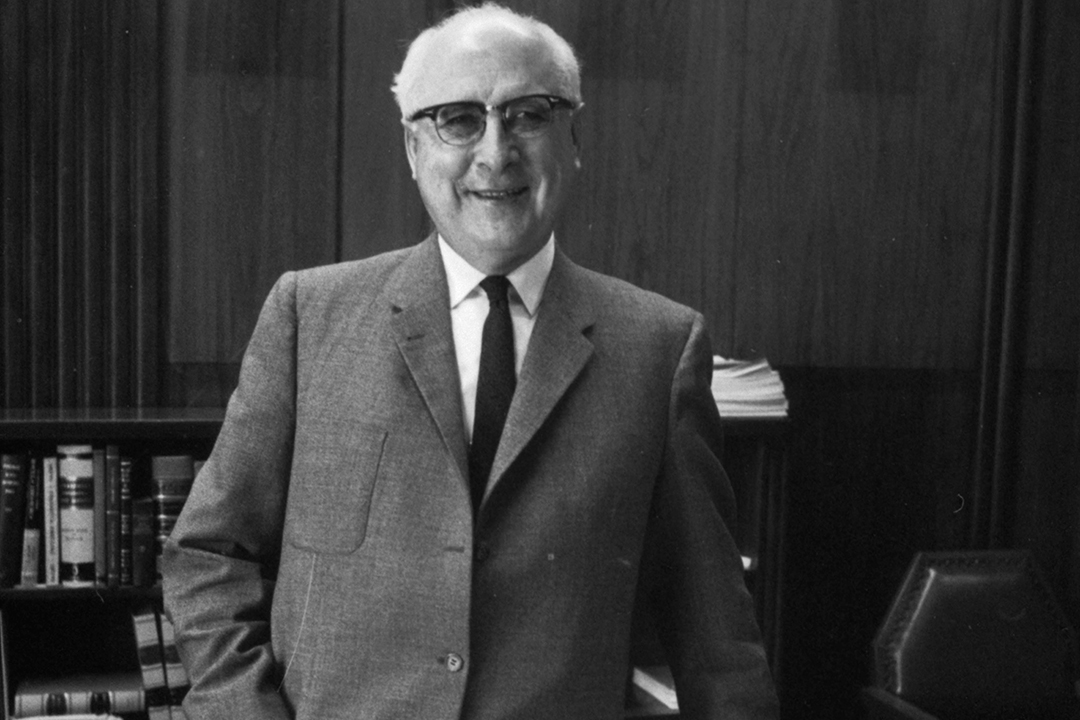
U of S names main university boardroom after alumnus and nation builder Emmett Hall
SASKATOON – The University of Saskatchewan (U of S) will name the boardroom of the Peter MacKinnon Building in honor of alumnus Emmett Hall (1898-1995), a major contributor to the national health-care system, a defender of Indigenous land claims and widely considered to be among Canada’s finest jurists of the 20th century.
“Hall was a nation builder whose legacy is inextricably linked to the history of the University of Saskatchewan,” said U of S President Peter Stoicheff. “It is fitting that this year marking Canada’s 150th anniversary of Confederation that we celebrate a Canadian who contributed tremendously to the betterment of our university, our province and our country.”
Stoicheff noted that a plaque in the boardroom, located in the centre of campus in the heart of university governance, will remind faculty, administrators and students who gather there for meetings of Hall’s social justice and civil libertarian legacy. The room already features a portrait of Hall from his time as chancellor.
Hall, a 1919 graduate of the U of S College of Law, taught at the U of S, received an honorary doctor of civil law degree in 1964, and served as the university's chancellor from 1980 to 1986.
Hall was called to the bar in 1922 and had a successful law practice. Whether serving as co-counsel for jobless on-to-Ottawa trekkers charged in the 1935 Regina Riots, or pushing to reverse a Regina social club’s exclusion of Jews, Hall earned a reputation as a civil libertarian.
Hall was appointed by then Prime Minister John Diefenbaker as Chief of Saskatchewan's Court of Queen's Bench in 1957. In 1961, he was made Chief Justice of Saskatchewan (appeal division) and a year later was appointed to Canada's Supreme Court. His dissenting judgment in the 1973 Nisga’a land claims case is credited with paving the way for entrenching Aboriginal rights in Canada’s constitution.
Hall is widely known as Canada’s ‘Father of Medicare', an honour he shared with Tommy Douglas, Premier of Saskatchewan, who introduced Canada’s first provincial government-funded health insurance in 1947. Hall chaired a Royal Commission on national health services, which in 1964 recommended nationwide adoption of public health insurance modelled on Saskatchewan’s pioneering Medicare legislation. Hall’s report became the foundation for health services in Canada provided by the federal and provincial governments.
The commission’s report, released in 1964, stated: “Health services must not be denied to certain individuals simply because the latter make no contribution to the economic development of Canada or because he cannot pay for such services. Important as economics is we must also take into account the human and spiritual aspects involved.” (Walter Stewart, The Life and Political Times of Tommy Douglas)
In 2017, Hall was named to the Canadian Medical Hall of Fame for his “profound and enduring impact on the organization and funding of health care in Canada. Considered a founding father of Canadian Medicare, he worked tirelessly throughout his law career for Indigenous rights, equal access to health care, and the rights of the disabled.”
Hall’s son, Dr. John Hall, a noted orthopedic surgeon and U of S graduate, said the university’s recognition of his father is fitting, as the institution played a significant role in the Hall’s family history.
“The establishment of the university was one of the prime reasons that drew the Hall family from Quebec to Saskatoon,” he said. “We are all very pleased that the University of Saskatchewan has chosen to honour his contributions in this fashion.”
-30-
For more information, contact:
Jennifer Thoma
Media Relations Specialist
University of Saskatchewan
306-966-1851
jennifer.thoma@usask.ca
Kathryn Warden
Director of Research Profile and Impact and Lead of the U of S Canada 150 Project
Office of the VP Research
University of Saskatchewan
306-966-2506
kathryn.warden@usask.ca
This initiative is part of the U of S Canada 150 Project which offers the university community an opportunity to reflect on its legacy and showcase the ways in which its students, staff, faculty and alumni have not only shaped Canada’s past, but are contributing to enriching the country’s present and future.

